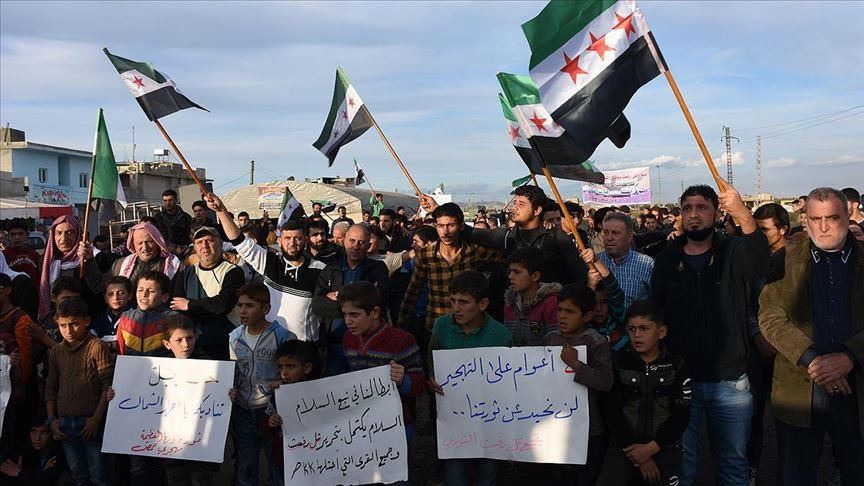
Dr. Amani Ballour:
'On Oct. 13, The New York Times published a story that proved that Syrian President Bashar al-Assad’s Russian allies deliberately bombed four hospitals in opposition-held Idlib province in May. Indiscriminate or intentional targeting of hospitals and medical facilities is a war crime, and both culprits have always denied the charges. In reality, Assad has targeted hospitals and other civilian structures from the start of the war, and Russia has done the same since it entered the war in 2015.
The Times investigation is important because it is apparently the first to present substantive proof of this specific war crime. The newspaper’s conclusions are based on comprehensive evidence from many sources, including thousands of Russian Air Force radio recordings of pilots and ground control officers. There are videos documenting the bombing of three of the four hospitals, and recordings of the Russian pilots confirming their strikes. There are testimonies of witnesses and survivors, and flight logs from the spotters who keep watch on the sky in order to warn civilians of impending attacks.
I know what it’s like to experience such an attack, having lived through many of them during the six years I worked as a pediatrician at the Cave, an underground hospital in East Al Ghouta. On September 28, 2015, Russian warplanes bombed the Cave, killing three male nurses and injuring two female nurses, including my friend Samaher. Samaher suffered terrible memory loss for about a year, but she continued working at the hospital despite the trauma she carried with her. When I became manager of the Cave in 2016, I did everything I could to shore up the infrastructure above and below ground so it could withstand bombings. I worked on evacuation plans to ensure the safety of patients and staff. We all knew another attack could come at any time. And the attacks multiplied in frequency and brutality as Assad and Russia closed in on Al Ghouta. During our final month in the Cave, we were hit five or six times by barrel bombs.
It can’t be said often enough: Assad and Russia are malign actors that cannot be trusted. When they agreed to help the Kurdish-led SDF in northeastern Syria, it wasn’t about protecting a vulnerable ethnic group. It was about positioning themselves in a regional conflict that has international ramifications that go beyond the Kurdish issue. The Syrian and Russian governments didn’t protect the Kurds in the past, and they won’t protect them once the current fight is over.
Assad has never been a friend to Syria’s Kurds, who are the country’s largest ethnic minority. All Syrians—Arabs, Christians, Kurds—have suffered under Assad’s regime. I have many Kurdish friends who took part in the 2011 demonstrations in Al Ghouta, one of the first and most important areas to speak out for freedom and democracy. We were all trapped there when the government laid siege to the area in 2013. When Russian troops marched into Al Ghouta in 2018, we were displaced.
The list of Assad’s war crimes is long. With the help of his allies Russia and Iran, he has committed these atrocities out in the open while the world looked on. Half of Syria’s population has been displaced. In the five-year siege of Al Ghouta, civilians were deliberately starved, deprived of medicine, and repeatedly bombed. Then there are the multiple chemical attacks on opposition territories. I was in East Al Ghouta in August 2013 when rockets loaded with sarin gas were dropped while people slept. I never imagined that one day the government would use chemical weapons to kill civilians. When that happened, I realized they wanted to kill everybody in Al Ghouta—and anyone in Syria who wanted freedom. All told, close to one million people have been killed and about half a million are detained in prisons where they are tortured and murdered. Two-thirds of the country is destroyed.
What concerns me now is the safety of the Syrian Arab and Kurdish citizens in the north, especially the women and children who always pay the highest price in wars. So far, some 160,000 people have been displaced, many of whom were already refugees from other parts of Syria. With winter coming, the situation is even more urgent. Every winter, refugee camps in the north are flooded with water and mud, and tents become uninhabitable. The camps in the northwest were already overcrowded and miserable and are hardly equipped to take in more homeless, traumatized civilians.
It is not too late for the free world to act, for Western nations to show that they believe what they say about human rights. An entire generation of Syrian children—2.6 million—have had no education whatsoever because of the war. They deserve schools in safe places, where they can learn without fear. Women in refugee camps often have no idea about their rights and they are frequently exploited to work for barely any pay. They deserve better.
Right now, the international community could direct resources to help the hundreds of thousands of displaced Syrians who will soon be freezing. There is plenty of empty land in the northwest of Syria, where non-government organizations could build houses for people needing shelter. But in no way should those houses be considered anything but temporary. Because it is long past time for Syrians to be able to return to their own homes.
For nearly nine years, the international community has let down the Syrian people. It has focused on solving the consequences of the crimes, instead of dealing with the culprits, Assad and his allies. It is not impossible to get Assad out of Syria, to hold him to account for his crimes against humanity. If we can get rid of Assad and free Syria of all foreign interference, then Syrians can begin new lives. We who are exiles and refugees can come home and join our fellow citizens in building a free, united, democratic Syria that includes all the Syrian people without discrimination.'


